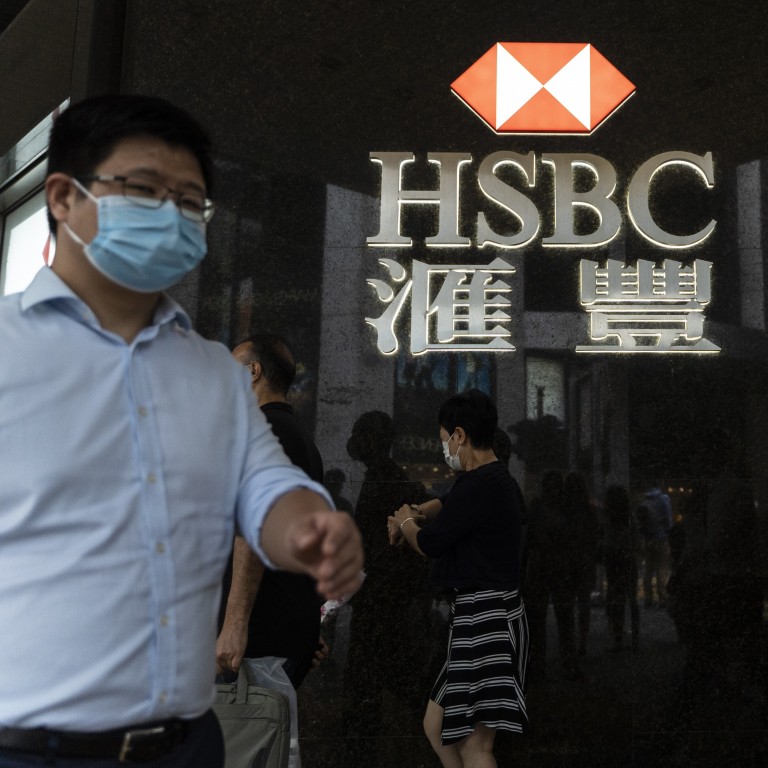
‘Lower-for-longer’ interest rates could weigh on HSBC and other Hong Kong lenders’ third quarter results, analysts say
- HSBC, Standard Chartered may benefit from a better trading environment in the third quarter, like US rivals
- Net interest margins are likely to have contracted further at the city’s biggest lenders in the third quarter, analysts say
Investors will be watching to see how “lower-for-longer” interest rates are weighing on the bottom lines of Hong Kong’s banks as the city’s biggest lenders prepare to report their third-quarter results beginning this week, according to analysts.
Payment holidays and government support programmes helped homeowners and businesses navigate the pandemic-sparked downturn and economic conditions are improving in the Asia-Pacific region, allowing the city’s banks to potentially move their provisioning back to a more normalised run rate, according to analysts.

04:35
Coronavirus: How close is Hong Kong to a fourth wave of Covid-19?
“The fairly material wrinkle remains net interest income,” Fahed Kunwar, an analyst at Redburn in London, said. “Both [HSBC and Standard Chartered] are geared to US rates. [The Hong Kong interbank offered rate] Hibor has been flat. US rates have come down. The question is have we digested the full impact of the rate reduction in the outlook for revenues for these two businesses.”
In the first half of the year, Standard Chartered discussed about £1 billion (US$1.3 billion) being lost in revenue because of lower rates and HSBC said US$3.5 billion of revenue could be lost because of lower rates, Kunwar said.
HSBC and Standard Chartered are both based in London, but count Hong Kong as their biggest market and generate the bulk of their profit in Asia.
HSBC is expected to report pre-tax profit of US$2.07 billion in the third quarter, including US$2.02 billion in provisions for expected credit losses, according to a consensus estimate compiled by the bank. That would represent a 58 per cent decline in pre-tax profit from the prior year period.
Standard Chartered is expected to report a third-quarter pre-tax profit of US$456 million, with US$614 million in credit impairments, according to a consensus estimate of 16 analysts compiled by the bank. That would represent a 59 per cent decline in pre-tax profit from the year-ago period.
This month, America’s biggest banks, including Bank of America, Citigroup and JPMorgan Chase, reported much lower provisions for credit losses than recent quarters and benefited from higher trading revenue in the quarter. Goldman Sachs saw its profit nearly double in the quarter, driven by a 29 per cent jump in trading revenue.
Kunwar said trading is an important – and often forgotten – revenue driver at HSBC and Standard Chartered and both should benefit from a better trading environment.

Banks are facing a “double down cycle” of lower interest rates and declining asset quality similar to the global financial crisis, according to Alfred He, an analyst at Jefferies.
“We are more conservative on [net interest margin] contraction given the asymmetrical decline in asset yield and funding cost, and we are less concerned on asset quality given safer loan book, better provision and policy response,” He said in an October 11 research report.
Bank of China (Hong Kong) is He’s top pick among Hong Kong banks, supported by a faster loan expansion, benign asset quality and better provisioning and capital provision.
Net interest margin pressure will persist for Bank of China (Hong Kong) in the third quarter, driven by lower rates, asset margin pressure and increased lower-margin loans tied to initial public offerings in the city, according to Yafei Tian, a Citigroup analyst.
Despite the crush of cash coming into the city, net interest income at Bank of China (Hong Kong) is likely to decline 15 per cent quarter-on-quarter and 28 per cent year-on-year in the third quarter, according to Citigroup.
“Government support measures (e.g. payroll subsidy, SME guarantees, direct support to specific sectors) seem to have averted the worst-case scenario,” Tian said in an October 9 research report. “No major large corporate default case has been reported in Hong Kong so far, despite the challenging macro. Covid-19 is well contained in China, which should help the asset quality of offshore exposures in our view.”

Standard Chartered chief executive Bill Winters told CNBC in September that the hope for stability from national security law “seems to have been well founded and is playing out”.
Grace Wu, senior director for Asia-Pacific banks, at Fitch Ratings, said the rating agency is monitoring the potential geopolitical risk for HSBC and other global banks.
“If you look at HSBC’s China contribution, that’s still doing reasonably well. They’re still continuing to grow their businesses in China,” Wu said. “There’s nothing conclusive that points to the fact, as a result of these geopolitical risks, HSBC is necessarily losing their ground or that it is having a huge damage to their franchise.”

